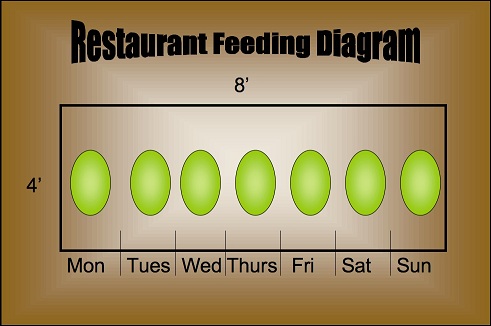Additional Worm Information
Castings:
1) Sprinkle around indoor plants, we suggest two tablespoons around the base per plant every four weeks.
2) Sprinkle around outdoor plants, we recommend 3-4 tablespoons.
3) Making tea we recommend 1/2 cup per gallon of water, shake and let sit for a few hours (until the water is a brownish color). Then we suggest applying liberally to the entire plant since the tea actually boosts the leaves from aphid attack as well. It is good to sprinkle the leaves as well as the base.
Feeding a 4 x 8 bin:
Mark with a pencil 5 spots on each side (two lids = two sides), nearest the outer edges of the three in-between. Use a thumbtack or strong sticker to mark where you feed, one on each side. Feed to the left, then feed to the right, but stay in sync with feeding each side.

Why one needs to put dirt into the bedding:
Since worms don't have teeth, the dirt acts as a digestive aid and is necessary for them to live. Working the dirt into the bedding will enable the worms to start eating the bedding once it begins to decompose.
If you need to deplete your worm stock and there is no one to give your worms to, try releasing them into your garden to help stimulate more growth. They are EXTREMELY beneficial in gardens. As you know, worms help break down decomposing matter. How they do this is by eating the bacteria that is breaking down the composting matter. When placed in a garden situation, the worms help break down any decomposing matter (getting rich nutrients to the plants faster), they aerate the soil by tunneling, and of course they leave behind worm castings which is nature's best fertilizer. A lot of the time, the worms hang out down by the roots of plants and consume bacteria that might be decomposing the roots... The worms themselves do not eat living roots.
As for cocoons, worm eggs should not be touched as some experts say the oil from your skin harms them. We use surgical gloves or a plastic baggy to dig through the worm bed and not harm the lil' guys.
A suggestion for those doing outdoor bins... In the winter months - reflectix (a shiny sided, sheet style, insulation material) works wonders for a cover and keeping the warmth in the bed.
Questions? Feel free to Contact Us














